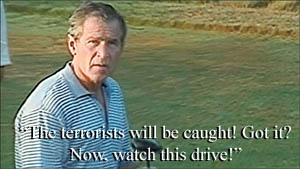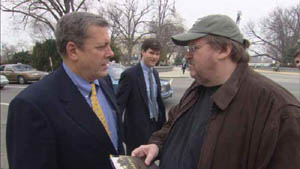|
Michael Moore's is an unusual success story. Beginning with his 1989 film Roger and Me, which chronicled Moore's attempts to speak with General Motors president Roger B. Smith concerning the rampant poverty that spread throughout Flint, Michigan following the closing of the local GM manufacturing plant, Moore has styled himself as a persecuter of the fat cats and power-lovers that traditionally prey upon the lower and middle classes. Many love him, many hate him. I'll admit my left-wing bias right off, but I don't go blindly after anyone regardless of affiliation, and I must say that, despite his often showboating persona, Moore is sorely needed in a country currently filled with ultra-conservative speakers the likes of Bill O'Reilly, Sean Hannity, Rush Limbaugh, and most of the Fox News Network.  From the outset, Moore makes no bones about the fact that he intends to be no more "fair and balanced" than Fox. He chooses instead to present his work as the balance to the largely affirmative and polite news coverage of the president and his policies that have dominated the media ever since the attacks of September 11, 2001 gave the newshounds of the world license to simply repeat what they are told instead of stirring up anything controversial in the midst of a crisis. Or well after the crisis, for that matter. While much of the information presented in Fahrenheit 9/11 was publicly available before the film's release, the mainstream news media for the most part chose to ignore it in favor of endless warnings about the danger from without, instead of probing the potential danger right here at home. Where was the outrage that had followed the exposure of the Watergate scandal? According to Moore, it was all but drowned out by a climate of constant worries over safety in all parts of the country, repeated "credible threats" of new attacks that never amounted to anything, and an attitude of "the attacks of 9/11 have given we, the government, carte blanche to do whatever we tell you is necessary in order to avert future disasters." So is he right? Quite possibly, yeah. From the very start, Fahrenheit 9/11 comes out swinging, beginning with George W. Bush's somewhat suspect election, or perhaps should we say "appointment" to the Presidency. From there, he goes on to chart the behavior of the Commander-in-Chief throughout the infamous suicide attack to the half-hearted attempts to capture Osama bin Laden and culminating in the full-bore assault on Iraq, a country which now, some four months after the film's release, has been utterly discredited as having ever posed a threat. But for the frighteningly corrupt portrait of the Bush administration Moore paints, the film is frequently quite funny for its first half in spite of the seriousness of what we're seeing. While there's little doubt that Moore spent much time searching out the juiciest tidbits of newsreel footage showing Bush at his worst in order to weight his viewpoint, it can hardly be argued that Bush hadn't provided a king's wealth of possibilities with his oft-noted inadequacies in public speaking and grammatical butcherings that would make a third-grade English teacher cry. Even Moore himself admits that the term "documentary" isn't strictly correct when describing his film. He's making entertainment out of making fun of the Bush presidency, a fact which is never more apparent than during the hilariously bombastic reading of "The Coalition of the Willing," which includes such countries as Micronesia and Costa Rica, not exactly known for their military might or capabilities.  The latter portion of the film, dealing with the consequences of the invasion of Iraq, is, for quite obvious reasons, a lot less humorous. The carnage and human suffering on both sides is disturbing and depressing, with its graphic, non news-friendly scenes of the casualties of a war which seemed to have no real purpose, or at least no just purpose. It's honestly hard to look at; both the footage of the dead and wounded and the interviews with the grieving survivors are upsetting to behold for anyone with an ounce of empathy. It's also inarguably the most important part of the film, in that it shows the end result of all that had been allowed to transpire beforehand, and it's one of the only places you'll get to see any negative perspective on the war in Iraq from our own troops, many of whom expressed disgust with the Bush administration and dismay at the fruitlessness of the war in interviews the nightly news never showed us. In the midst of one of the most secretive administrations ever, Fahrenheit 9/11 is a refreshing reminder of the power of freedom of speech and the rights that we must not allow our leaders to rescind in the name of covering their own asses (I'm talking to you, Mr. PATRIOT act). Many conservative groups are predictably responding to the film with allegations of "Lies, lies, lies!" though I've yet to hear of a single lie having been unearthed*; indeed, the extensive bibliography that appears on Moore's own website and the fact-checking team of lawyers he assembled to avoid just such an issue make it rather unlikely that any potentially litigious material could've sneaked through. The conclusions drawn from the facts are of course Moore's own, which one may feel free to dispute in whole or in part if they so choose, though such criticisms are more respectable if they issue from a source that has actually seen the film-the White House spokesman who claimed that he "didn't need to see the film to know that it was full of lies" somehow lacks credibility. As a rationalist, I must remind myself that correlation does not equal causation, and that the human mind has an ingrained tendency to find patterns amongst the chaos whether they're there or not. I cannot therefore say for certain that the film's assertion that the Bush agenda was about profit at the expense of the lives of our troops and countless Iraqi civilians is wholly correct. But even taken as unrelated incidents instead of a complex web of manipulation, the actions of the government under the leadership of George W. Bush screams corruption. Whether he was planning long-range profiteering or simply giving out favors to friends and confidants, it can scarcely be denied that choosing a business colleague in the oil industry to be the new leader of Afghanistan does nothing to engender feelings of trust for America in a part of the world that already has enough saved hatred for us to last for decades to come. This is the real message of Fahrenheit 9/11: that there is nothing patriotic or American about passive compliance with authority and obediently doing whatever we're told without raising our voices when something seems untoward. Britney Spears may think we should all just shut up and obey, but she's hardly a role model for the thinking man. *This was true at the time I first wrote this review; time has subsequently unearthed a number of untruths herein, some, by their nature, undoubtedly deliberate. This is a shame (in the sense that the film should've stuck to the facts, and not in the sense that I'd have preferred some of those things to be true), as the corruption of the Bush Administration could've provided plenty of material for a wholly honest exposť. The inclusion of polarizing yet false information merely hurts the cause Moore purports to support, and weakens the film as a piece of social criticism. -review by Matt Murray
|
|
||||||||